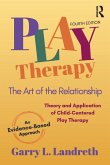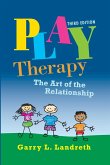Designed for professionals adding play therapy to their practices as well as for graduate students, the second edition of Child-Centered Play Therapy is comprehensive, engaging, and practical.
The authors provide a strong theoretical base from which to understand the whys and hows of child-centered play therapy and guide readers through all necessary skills for successful practice. From playroom setup, tracking and empathy, limit-setting, and role-play to treatment planning, recognizing stages, measuring progress, and working with parents and teachers, each chapter anticipates readers' questions and covers key concepts in diverse ways to meet different learning styles.
On the book's website, readers will find a test bank, sample slides and syllabi, treatment planning forms, as well as additional activities and worksheets for students and trainees.
Key Features:
Everything needed for best practices in child-centered play therapy in one book.
Plain-spoken, practical writing.
Vivid case stories and vignettes.
New neuroscience findings linked to long-held wisdoms of child-centered play therapists.
Outcome research reviewed across problem areas of externalizing and internalizing behaviors, school problems, applications with children with disabilities, adverse childhood experiences, and trauma.
Endorsed by Louise Guerney, a founding child-centered play therapy figure who developed the skills-based methods covered in this book, Child-Centered Play Therapy comprehensively and realistically introduces practitioners to the child-centered approach to play therapy and addresses how to incorporate the approach into schools, agencies, or private practice.
The authors provide a strong theoretical base from which to understand the whys and hows of child-centered play therapy and guide readers through all necessary skills for successful practice. From playroom setup, tracking and empathy, limit-setting, and role-play to treatment planning, recognizing stages, measuring progress, and working with parents and teachers, each chapter anticipates readers' questions and covers key concepts in diverse ways to meet different learning styles.
On the book's website, readers will find a test bank, sample slides and syllabi, treatment planning forms, as well as additional activities and worksheets for students and trainees.
Key Features:
Everything needed for best practices in child-centered play therapy in one book.
Plain-spoken, practical writing.
Vivid case stories and vignettes.
New neuroscience findings linked to long-held wisdoms of child-centered play therapists.
Outcome research reviewed across problem areas of externalizing and internalizing behaviors, school problems, applications with children with disabilities, adverse childhood experiences, and trauma.
Endorsed by Louise Guerney, a founding child-centered play therapy figure who developed the skills-based methods covered in this book, Child-Centered Play Therapy comprehensively and realistically introduces practitioners to the child-centered approach to play therapy and addresses how to incorporate the approach into schools, agencies, or private practice.
"This is a fully comprehensive manual on child-centered play therapy (CCPT ) for trainers, students, and practitioners! The authors provide not only a treasure of information on the CCPT approach but also myriad case examples, learning activities, and practical exercises within each chapter. For trainers, this expands and solidifies the essential CCPT skills for their students, ensuring this approach is practical and fully applicable. The structure of the book matches the developmental nature of training, enabling the pace of personal development and self-understanding to scaffold and consolidate learning. The second edition provides a new chapter covering updated research outcomes, cultural competence, and intersections with neuroscience. This timely addition makes this book a top choice for CCPT trainers, their students, and for practitioners both novice and experienced." Judi Jacobsen, MNZAC, founding director of ChildPlayWorks
"Child-Centered Play Therapy is a theory- and research-based practical guide for learning fundamental play therapy skills such as tracking and responding to questions. It includes chapters that address alternative play therapy skills, such as filial therapy, and essential accountability skills for working in organizations, such as evaluating and reporting progress, goal setting, and treatment planning. Ethical issues in play therapy are woven throughout the text and in a dedicated chapter on the topic. The text is a well-balanced integration of theory, research and practice on play therapy." Joanne Cohen, PhD, professor of counseling education and student affairs, Kutztown University
"I have used various textbooks over the years to teach students the core skills of child-centered play therapy. This has been in both face-to-face settings and online courses. While many texts do a fine job of presenting the basic skills of child-centered play therapy, Child-Centered Play Therapy meets every item on my checklist, reducing the supplemental readings that I used to provide. The clear, understandable writing, the firm foundation of the core skills and ideal qualities of the therapist, and the helpful advice from seasoned play therapists has made this book a delight to use in teaching students child-centered play therapy. From suggested reading material in the waiting room for parents, to toy selection, to clear examples of how to respond to the child, to getting at the heart of the matter, this book has it all." Harvey Payne, PsyD, associate professor, dean, and vice president for academic affairs for digital learning at the Institute for the Psychological Sciences, Divine Mercy University
"Child-Centered Play Therapy is a theory- and research-based practical guide for learning fundamental play therapy skills such as tracking and responding to questions. It includes chapters that address alternative play therapy skills, such as filial therapy, and essential accountability skills for working in organizations, such as evaluating and reporting progress, goal setting, and treatment planning. Ethical issues in play therapy are woven throughout the text and in a dedicated chapter on the topic. The text is a well-balanced integration of theory, research and practice on play therapy." Joanne Cohen, PhD, professor of counseling education and student affairs, Kutztown University
"I have used various textbooks over the years to teach students the core skills of child-centered play therapy. This has been in both face-to-face settings and online courses. While many texts do a fine job of presenting the basic skills of child-centered play therapy, Child-Centered Play Therapy meets every item on my checklist, reducing the supplemental readings that I used to provide. The clear, understandable writing, the firm foundation of the core skills and ideal qualities of the therapist, and the helpful advice from seasoned play therapists has made this book a delight to use in teaching students child-centered play therapy. From suggested reading material in the waiting room for parents, to toy selection, to clear examples of how to respond to the child, to getting at the heart of the matter, this book has it all." Harvey Payne, PsyD, associate professor, dean, and vice president for academic affairs for digital learning at the Institute for the Psychological Sciences, Divine Mercy University








